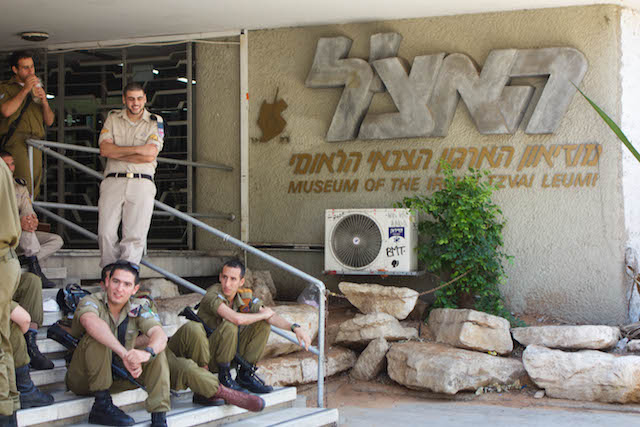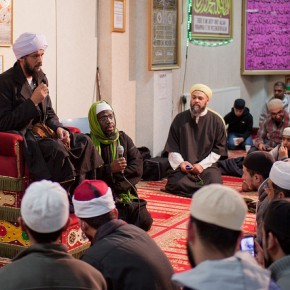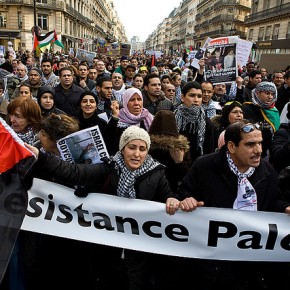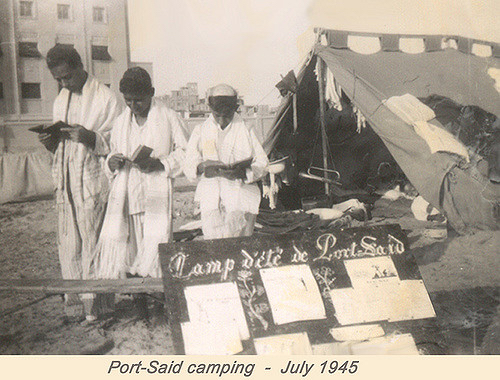As I read the article, I started shaking. Tears streamed down my face. It was about an old man in Beit Hanoun, Gaza. On Friday night, eight members of his family, including his sons, daughters and grandchildren, had finished their Iftar meal and sat down to watch a popular television show. A few minutes into it, an artillery shell ripped through their home, killing them all, including children aged six, two, and one.
I have devoted my professional, and no small part of my personal life, to the Israel-Palestine conflict for over fifteen years. I learned a long time ago that I cannot let each tragedy affect me so, or I would be unable to continue this work at best, lose my mind at worst. But I wept, uncontrollably, for ten minutes. I wept until I could gather myself enough to go to my son and hug him tight.
Why did I break down on this story? It is undeniably tragic. But I have seen many horrifying things, heard and read many heart-rending stories in the years I have worked on this conflict. What was different about this one?
There was, sadly, nothing different about this story. It is among the most tragic I’ve read, but it has all too much company, some of it also from the Israeli side. I realized it was connected to something I had been doing just before I saw this story: reading some statements from Jews who, like myself, were appalled by Israel’s actions in Gaza and demanded they stop.
One common theme in many of those statements was that Israel’s actions did not reflect “my Judaism.” The Judaism many of my friends and colleagues know is one that stands for universal values, justice, fairness, and helping the oppressed. This was a Judaism many of my generation, and subsequent ones were raised on, a tradition of left-wing activism, socialism, and leading activism in struggles for civil rights against forces of racism, sexism, homophobia and other similar scourges. It’s a very real Judaism for many Jews all over the world.
And I wept because the Judaism they described, real as it might be, is not my Judaism. It is not the one that was ingrained into me as an orthodox child in New York City in the 1970s. That Judaism of justice was not the one I was exposed to when, one Shabbat afternoon, I shook the hand of Rabbi Meir Kahane, the radical, racist founder of the fascist Jewish Defense League (JDL) and the overtly racist Kach party in Israel. Kahane, indeed, may well have been the rabbinical symbol of my Judaism, while Abraham Joshua Heschel might have been that for many of my friends.

I wept because the massacre that is still raging in Gaza is my Judaism. I understand the mindset that is supporting these attacks, that is untroubled by Israeli weapons killing hundreds of civilians and many children. I don’t speak now of the leaders, but of the people. The onslaught in Gaza enjoys widespread support in Israel, and much of the criticism comes from the right complaining that Netanyahu is not hitting the Palestinians hard enough. While, as usual, many American and European Jews stay silent because they don’t want to be banded traitors to their community, and more than most people think are standing up against the ongoing atrocity in Gaza, a great many others not only support Israel’s actions here, they see Israel as John Kerry absurdly described it: “Israel is under siege by a terrorist organization.”
Many wonder how this level of self-deception can be achieved. How, many ask, can Jews in Israel, Europe, the United States, Canada, and Australia see themselves as aggrieved parties? In Israel, Jews are, by definition, the power structure of the country. That country has by far the greatest economic and political stability in the region, and is so much the regional superpower militarily that no combination of other Middle Eastern states can reasonably be expected to defeat it by military force. And, of course, it is the only country in the region with nuclear weapons. Just what does it take for Jews to feel secure?
There is, of course, no one answer. Many Jews don’t feel so insecure, so fearful, even now with many rockets being launched at Israel. Many Jews oppose Israel’s policies, and there have been well attended protests in Israel despite the efforts of right wing thugs who have attacked the protesters. And those who do support Israel’s actions may do so for a wide variety of reasons. But for some, indeed I think many, the experience of my own Judaism offers some grim insight.
One thing I should clarify is that I received a lot of mixed messages in the orthodox Jewish community of my childhood. For instance, it was at first ingrained into me that Jews were special, chosen by God to receive the Torah. The message was only occasionally explicit. However, I was taught that Jews were better than non-Jews. But, later in my Jewish education, I encountered other rabbinical teachings and different, though no less orthodox, rabbis who explained that God actually offered the Torah to every other people on earth before the Jews. All of them refused it—and so did the Jews.
But God had always intended for the Jews to receive the Torah; he knew the other nations would refuse it. When the Jews followed suit, he held Mount Sinai in the sky over them and threatened to bury them under it unless they accepted the Torah. This last teaching helped me find my own path, one that reflected universal values and still incorporated a Judaism. But the earlier lesson remains a part of me to this day: a visceral sense of Jewish superiority.

I was also taught some principles learned much more from centuries of anti-Semitism, culminating in the Holocaust. My Judaism taught me that Jews can never trust non-Jews; that the next wave of persecution, expulsion or genocide is waiting just around the corner no matter how good things seem to be. Thus, Jews, often even including less religious Jews, lived in tight-knit communities, often had only Jewish friends, and made sure we helped each other—because no one else would.
This was only enhanced by the virtually mythical status Israel had when I was a child, especially in the decade and a half after the 1967 war. Israel was just a little country that just wanted peace. We understood with perfect clarity that the Arabs (the term “Palestinian” was almost never used in my community until the late 1980s) only fought us because they hated the Jews with such a fierce passion. There were no Arab victims, only Jewish ones.
That was an American narrative and never really existed in Israel. But it was a powerful force among pro-Israel Jews of the 1970s. I will never forget a children’s magazine I was given when I was 11 or 12. It was after Anwar Sadat had made his historic address to the Israeli Knesset in 1977, and during the time that US President Jimmy Carter was working to put together the even more historic Camp David Summit. On the cover of the magazine was a caricature of Israeli Prime Minister Menachem Begin. He wore an exaggerated, but warm and friendly, smile and was offering his hand in friendship. He offered that hand to Yasir Arafat, who was wearing an equally exaggerated smile, but his was sinister and conniving. Arafat was extending an olive branch to Begin with one hand, while the other held a machine gun behind his back.
That was my Judaism. It was cultivated in an affluent and privileged community, which was relatively new to that status and still scarred from the death and trauma of the Holocaust, during which the US and the rest of the world closed its borders and presented great obstacles to Jews trying to flee the Nazis. Thus was born the odd mix of white privilege and oppressed peoples’ fear that laid the basis for so much of what we see today. It was made in America and a lot of what we see today is the result of many years of importing that thinking into Israel.
I have found other Judaisms, and I have made some of them my own. But nothing can ever change what I was brought up in. My Judaism will forever be the one I was raised in, no matter how much I reject it.
And so, I wept. Because the idea that the very real fear that Israelis are living with due to rocket fire from Gaza is an excuse for the massive murder of innocents, the destruction of infrastructure and homes and infinitely greater trauma in Gaza comes out of my Judaism. The bogus and self-absorbed excuse that Israelis and their supporters comfort themselves with—that this is really all Hamas’ fault – comes out of my Judaism. The idea that Israeli lives are precious and Palestinian lives are cheap comes out of my Judaism. Indeed, the very notion that we had the right, due to our suffering to dispossess the Palestinians and to justify 47 years of occupation comes out of my Judaism.
And so I weep.
Photographs courtesy of Joel Schalit





